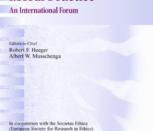Explain the differences between absolute and relative morality
Absolute morality means any theory in which the rules are absolute: they are unchanging and universal and come in a variety of forms. Relative morality means any theory in which something is judged in relation to something else and is therefore open to change.
Absolute laws or rules of morality will never change. More or less meaning they are objective. Objective means that I am not bringing in any personal opinions or bias, so the rules that I work out are rules that anybody else would rationally come up with. We may come to work out these rules by use of reason and so any rational human being would be able to use his/her reason to come up with the same set of rules.
For example, using reason, work out that it is wrong to lie. An absolutist would think that it is therefore always wrong to lie, in any situation and in any culture.
So it is just as wrong for me to lie about cheating on my boyfriend as it is to lie about the fact that Santa isn't real. And I can never think it is right to lie, even, to use Kant's famous example, if there was a murderer at my door enquiring as to the whereabouts of my friend. If I knew my friend was hiding in my house, I would have to tell this to the murderer. In this situation, Kant would say that if I had lied to the murdered, and then in some strange coincidence my friend had left my house and was met in the street by the murder that then killed him, I would be held morally accountable, since I had lied.
Relative morality refers to the opposite theory. Whereas absolute means...


